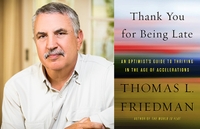The Lexus and the Olive Tree
Thomas L. Friedman. Farrar Straus & Giroux, $27.5 (394pp) ISBN 978-0-374-19203-7
""In the Cold War, the most frequently asked question was How big is your missile?' In globalization, the most frequently asked question is How fast is your modem?' "" So writes New York Times Foreign Affairs columnist Friedman (author of the NBA-winning From Beirut to Jerusalem), who here looks at geopolitics through the lens of the international economy and boils the complexities of globalization down to pithy essentials. Sometimes, his pithiness slips into simplicity. There's a jaunty innocence in the way he observes that ""no two countries that both had a McDonald's had fought a war against each other, since each got its McDonald's."" For the most part, however, Friedman is a terrific explainer. He presents a clear picture of how the investment decisions of what he calls the ""Electronic Herd""--a combination of institutions, such as mutual funds, and individuals, whether George Soros or your uncle Max trading on his PC--affect the fortunes of nations. The book's title, in its reference to both the global economy (the Lexus) and specific national aspirations and cultural identity (the olive tree), echoes Benjamin Barber's Jihad vs. McWorld. Like Barber, Friedman takes note of what may be lost, as well as gained, in the brave new world: ""globalization enriches the consumer in us, but it can also shrink the citizen and the space for individual cultural and political expression."" The animating spirit of his book, however, is one of excitement rather than fear. Some of the excitement is the joy a good lecturer feels in making the complex digestible. Writing with great clarity and broad understanding, Friedman has set the standard for books purporting to teach Globalization 101. 100,000 first printing; author tour. (Apr.)
Details
Reviewed on: 03/29/1999
Genre: Nonfiction


